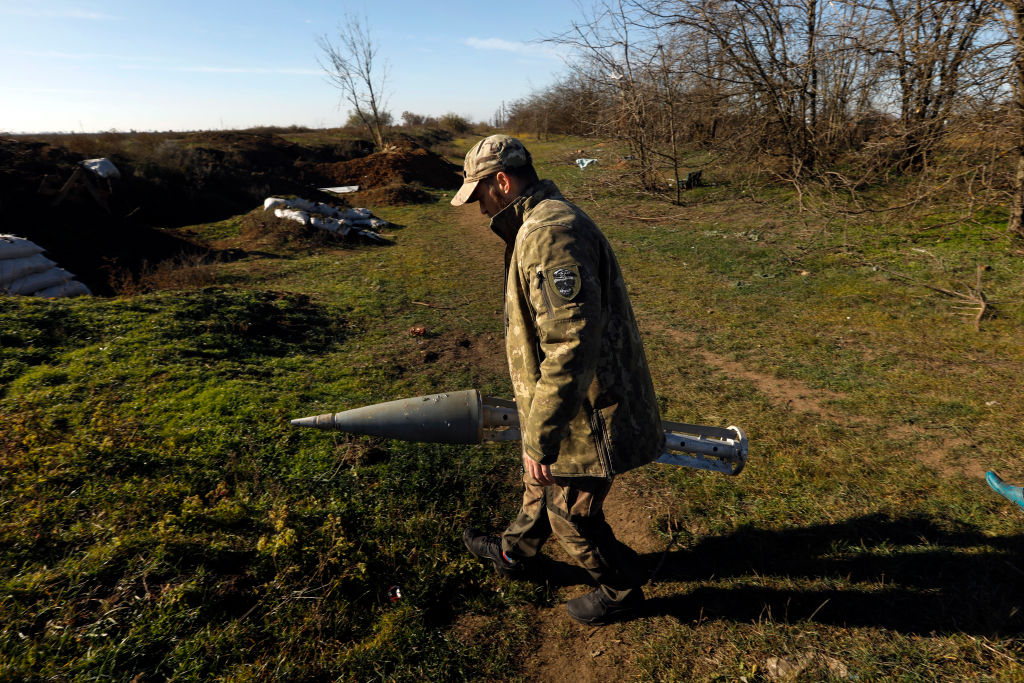The controversy over the Biden administration’s decision to supply Ukraine with cluster munitions reminded me of my old boss William F. Buckley’s famous rejoinder to claims the United States and the Soviet Union were morally equivalent because they both possessed nuclear weapons and spent a lot on defense. His phrasing varied, but here’s the gist: If one man pushes an old lady in front of an oncoming bus and another man pushes an old lady out of the way of a bus, it’s wrong to describe them both as the sort of men who push old ladies around.
Now, no one—except for fringe Putin apologists—is claiming we’re no better than the Russians. But a strange claim of moral equivalence is at play on the cluster munitions question.
One thing needs to be said first: These can be horrible weapons and people who want to ban them have defensible arguments on their side. “Cluster munition” or “cluster bomb” is a term for a whole family of weapons that can be dropped from planes or launched by artillery or rocket. Each device contains multiple, sometimes hundreds, of “submunitions” that disperse over a relatively large area. These submunitions, when working properly, detonate on impact.
The key phrase is “working properly.” A fraction, sometimes a large fraction, don’t explode immediately. Instead, they lie dormant on—or under—the ground, becoming small landmines. Thinking they’re toys or souvenirs, children can pick them up only to be killed or maimed. Farmers, sometimes years after the conflict, have been killed by them.
More than 100 nations have banned them. The United States, Russia, China, and Ukraine have not. The American rationale for keeping them is that there are circumstances where they are superior—both in military effectiveness and in limiting civilian deaths—to the alternatives. Still, in 2008, then-Secretary of Defense Robert Gates signed an order to phase out cluster munitions with a failure or “dud” rate greater than 1 percent after 2018. The Trump Defense Department rescinded that policy while promising to continue to work on reducing the dud rate.
This is where the false moral equivalence comes in. Russia, as a matter of policy, uses cluster bombs that have a dud rate of 30 to 40 percent. They’ve been using them in Ukraine since the beginning of their invasion. Not only that, they have deliberately targeted civilian targets, including a hospital and a playground. Targeting civilian and civilian infrastructure is a war crime, regardless of whether a country uses cluster munitions. But Russia, which has targeted civilians from the start of the war to terrorize the Ukrainian population into submission, sees the delayed carnage of cluster munitions as a feature, not a bug.
Meanwhile, Ukraine has also used cluster munitions—not on Russian civilians, but on the hardened battlefield positions of Russian invaders.
Indeed, if you take Vladimir Putin at his word, the Ukrainians he’s been killing are actually Russians, because, he claims Ukraine isn’t a “real” country, it’s part of Russia.
So yes, cluster bombs are awful. But the moral status of all weapons, like all wars, depends on the context. Using a gun to attempt rape or murder is not the same as using a gun to defend yourself. Ukraine has promised to use cluster munitions as sparingly and precisely as possible. Russia is still lying about using them at all. Ukraine uses them to repel invaders on their soil. Russia uses them as a tool of conquest. And, most relevant, Ukraine has every incentive to limit civilian casualties—because the civilians in question are Ukrainians.
Progressive Democrats, including California Rep. Barbara Lee, oppose Biden’s decision. “Cluster bombs should never be used. That’s crossing a line,” Lee told CNN. She says this will cost America its “moral leadership.”
I agree it’s crossing a line. But the whole point of leadership is knowing when an action is necessary and justified. If Russia hadn’t invaded Ukraine, sending them any weapons would cross a line. But Russia lawlessly invaded Ukraine, and moral leadership requires preventing Russia from getting away with it
“It took me a while to be convinced to do it,” President Biden told CNN’s Fareed Zakaria. “But the main thing is, they either have the weapons to stop the Russians now … or they don’t. And I think they needed them.”
Biden’s right.
My only criticism is that we’re sending these weapons because we’ve been too slow in supplying others. If Ukraine had access to F-16 jets, it might not need cluster bombs at all.







Please note that we at The Dispatch hold ourselves, our work, and our commenters to a higher standard than other places on the internet. We welcome comments that foster genuine debate or discussion—including comments critical of us or our work—but responses that include ad hominem attacks on fellow Dispatch members or are intended to stoke fear and anger may be moderated.
With your membership, you only have the ability to comment on The Morning Dispatch articles. Consider upgrading to join the conversation everywhere.